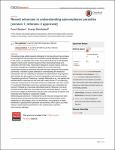Recent advances in understanding apicomplexan parasites
Seeber, Frank
Steinfelder, Svenja
Intracellular single-celled parasites belonging to the large phylum Apicomplexa are amongst the most prevalent and morbidity-causing pathogens worldwide. In this review, we highlight a few of the many recent advances in the field that helped to clarify some important aspects of their fascinating biology and interaction with their hosts. Plasmodium falciparum causes malaria, and thus the recent emergence of resistance against the currently used drug combinations based on artemisinin has been of major interest for the scientific community. It resulted in great advances in understanding the resistance mechanisms that can hopefully be translated into altered future drug regimens. Apicomplexa are also experts in host cell manipulation and immune evasion. Toxoplasma gondii and Theileria sp., besides Plasmodium sp., are species that secrete effector molecules into the host cell to reach this aim. The underlying molecular mechanisms for how these proteins are trafficked to the host cytosol (T. gondii and Plasmodium) and how a secreted protein can immortalize the host cell (Theileria sp.) have been illuminated recently. Moreover, how such secreted proteins affect the host innate immune responses against T. gondii and the liver stages of Plasmodium has also been unraveled at the genetic and molecular level, leading to unexpected insights. Methodological advances in metabolomics and molecular biology have been instrumental to solving some fundamental puzzles of mitochondrial carbon metabolism in Apicomplexa. Also, for the first time, the generation of stably transfected Cryptosporidium parasites was achieved, which opens up a wide variety of experimental possibilities for this understudied, important apicomplexan pathogen
Files in this item
No license information

